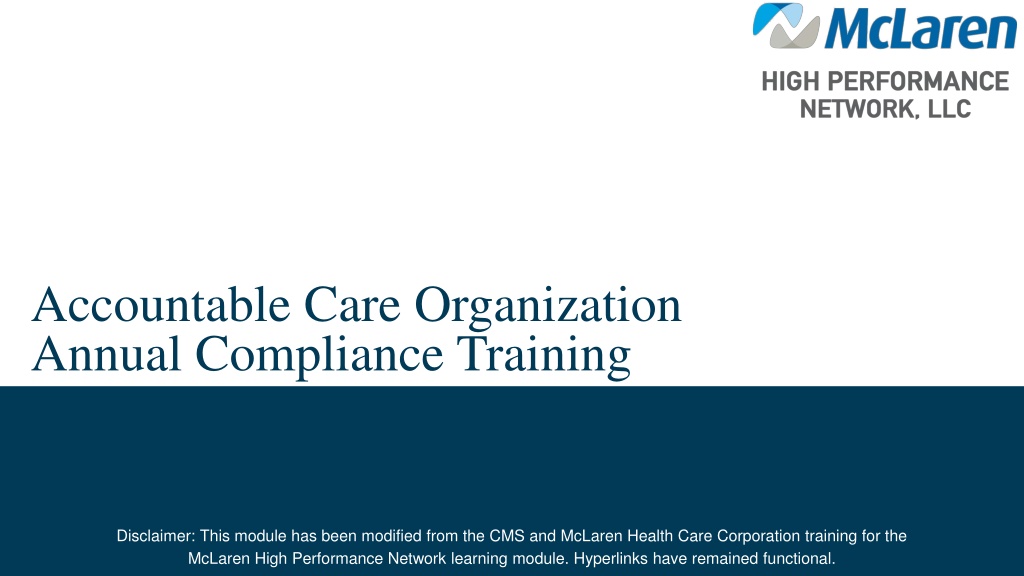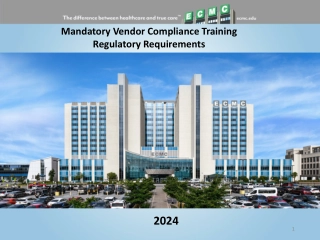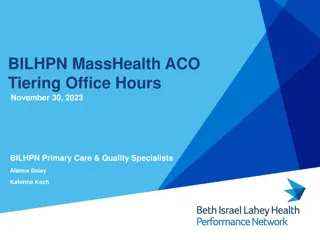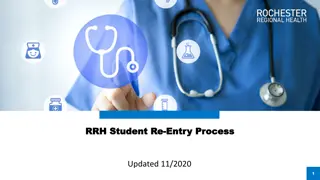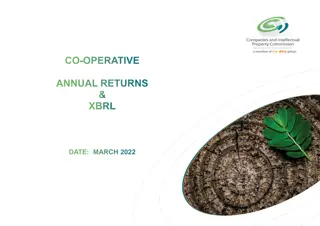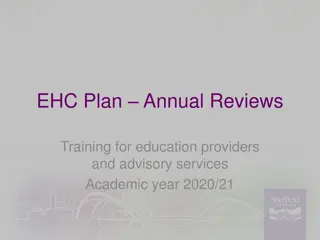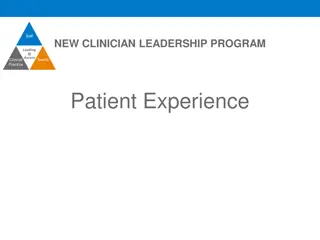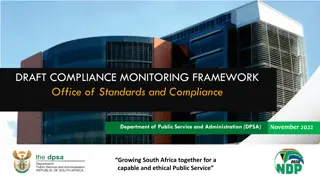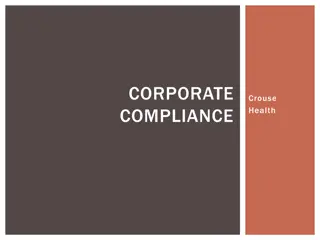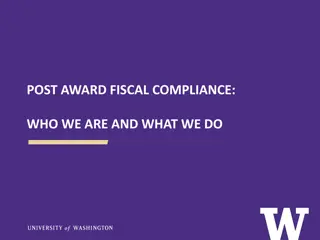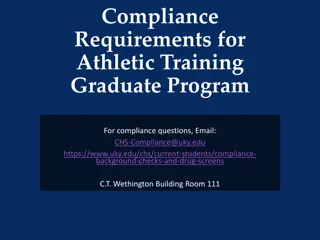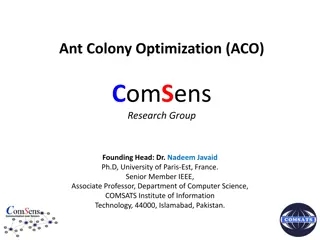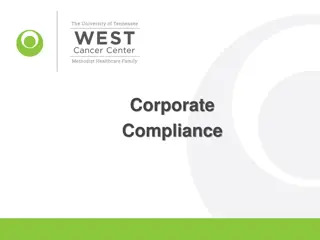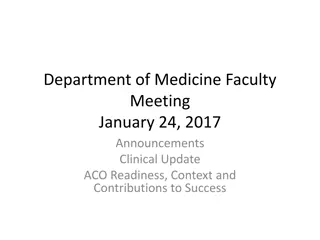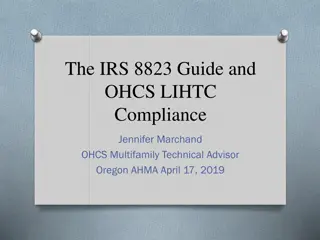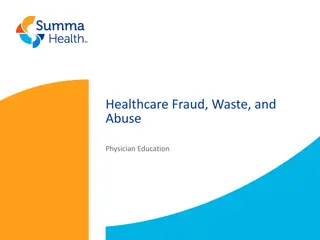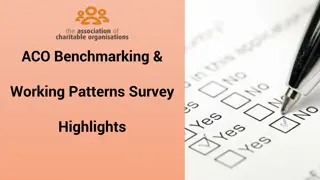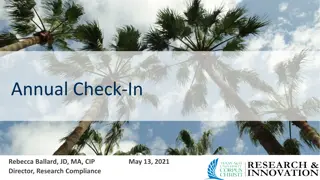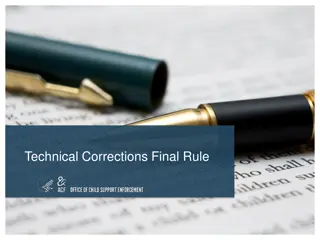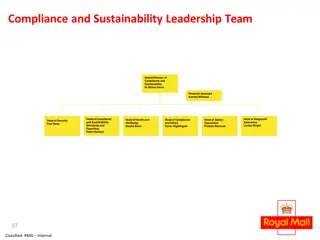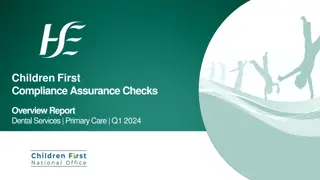ACO Annual Compliance Training Overview
The ACO Annual Compliance Training emphasizes the importance of compliance in healthcare organizations. It covers key topics such as Federal False Claims Act, Fraud, Waste, and Abuse (FWA), Stark Law, and participant roles in the McLaren High Performance Network ACO. Providers are required to complete this training annually and maintain documentation for 10 years to ensure compliance with Medicare regulations.
Download Presentation

Please find below an Image/Link to download the presentation.
The content on the website is provided AS IS for your information and personal use only. It may not be sold, licensed, or shared on other websites without obtaining consent from the author. Download presentation by click this link. If you encounter any issues during the download, it is possible that the publisher has removed the file from their server.
E N D
Presentation Transcript
Accountable Care Organization Annual Compliance Training Disclaimer: This module has been modified from the CMS and McLaren Health Care Corporation training for the McLaren High Performance Network learning module. Hyperlinks have remained functional.
COMPLIANCE PROGRAM Annual Compliance Training Annual Compliance training is a requirement of all MHPN participants as stated in your agreement and is important in the integrity of the ACO s compliance program.
ACO Annual Compliance Training COMPLIANCE PROGRAM A Compliance Program helps an organization abide by all applicable rules, standards and organizational policies. Organizations participating in programs governed by the Centers for Medicare & Medicaid Services (CMS) are required to have an effective Compliance Program, including annual compliance training. The McLaren High Performance Network (MHPN) Accountable Care Organization (ACO) has an agreement with CMS for a Medicare Shared Savings Program (MSSP). The MHPN ACO s Compliance Program includes training, auditing and monitoring, and a system to report compliance concerns. The MHPN ACO s participants are required to report any violations of applicable law or policy. Reports may be made confidentially to the MHPN Compliance Hotline at (844) 368-1816. The MHPN ACO s Compliance Program includes a designated compliance official who is not legal counsel to the ACO and reports directly to the ACO s governing body. Annually, a compliance work plan is developed by the MHPN Compliance Committee, which is overseen by the Board of Directors. The members of the Board of Managers complete a conflict of interest survey annually.
ACO Annual Compliance Training COMPLIANCE PROGRAM This training provides MHPN ACO Providers with information and education about laws, policies and programs designated to detect and prevent fraud, waste and abuse related to federally funded governmental programs like Medicare. In addition, this training will explain the compliance risks specific to the MHPN ACO, such as Confidentiality, Utilization and Beneficiary Assignment. The ACO must track and maintain documentation of the completion of this training by its Providers. o After review of this training material, participants will complete a 2021 Compliance Training Attestation through SurveyMonkey. Details are at the end of this presentation. Participants are required to maintain documentation of all providers completing this Training, demonstrating compliance training requirements for a period of 10-years.
ACO Annual Compliance Training OBJECTIVES After review of this training material, you should be able to: Understand the Federal False Claims Act (FCA). Define and list examples of Fraud, Waste and Abuse (FWA). Have an understanding of the laws regarding FWA and reporting requirements. Have an understanding of the physician self-referral Stark law. Describe your role as a Participant in MHPN ACO. Understand compliance risk areas.
ACO Annual Compliance Training COMPLIANCE PROGRAM What is Non-Compliance? Conduct that does not conform to laws, state and/or federal health care program requirements, or MHPN ACO ethical and business policies. Compliance Risk Areas: Beneficiary Notices Conflicts of Interest Claim Submissions Documentation Data Use Agreements Ethics HIPAA-Health Insurance Portability and Accountability Act Quality of Care Consequences of Non-Compliance: Disciplinary Action Contract Termination Criminal & Civic Penalties Refunds of Overpayments Exclusion from participation in all Federal health care programs
ACO Annual Compliance Training THE FEDERAL FALSE CLAIMS ACT (FCA) The FCA is a law imposing liability on persons and/or companies who defraud governmental programs. It is the government s primary tool in combatting fraud against the government. The FCA prohibits, among other things, any person or organization from knowingly submitting, or causing to be submitted, or conspiring to submit, or from making a false record or statement in connection with the submission of a false or fraudulent claim for payment to the U.S. government. The federal government enforces the FCA.
ACO Annual Compliance Training THE FEDERAL FALSE CLAIMS ACT (FCA) Examples of a false claim include, but are not limited to: Billing for procedures not performed Billing for services that are medically unnecessary Billing separately for services that should be bundled (or unbundling) Falsifying information in a medical record Billing more than once for the same services Failure to return an overpayment within 60 days of identification Billing an otherwise appropriate claim when the service itself resulted from an inappropriate arrangement between a provider and a hospital or other healthcare entity (Stark or Anti-Kick-Back).
ACO Annual Compliance Training THE FEDERAL FALSE CLAIMS ACT (FCA) Some points to remember about the FCA: False claims may result from something other than an intent to break the law. False claims may arise from repeated errors that reflect deliberate ignorance or reckless disregard of the rules. The FCA allows individuals to act as whistleblowers and sue any person or entity they believe has defrauded the government. The government may join the suit if it believes the whistleblower s case has merit. If the case is won, the whistleblower is entitled to a portion of any money recovered. Penalties under the FCA are significant and may include fines of millions of dollars, as well as exclusion from government health care programs.
ACO Annual Compliance Training FRAUD, WASTE and ABUSE Criminal Fraud: Knowingly and willfully executing, or attempting to execute, a scheme or artifice to defraud any health care benefit program; or to obtain, by means of false or fraudulent pretenses, representations, or promises, any of the money or property owned by, or under the custody or control of, any health care benefit program. (18 United States Code 1347) What does this mean? Intentionally submitting false information to the government or a government contractor in order to get money or a benefit. Examples of actions that may constitute Fraud: Billing for services not furnished or provided, including cancelled appointments Altering claims, medical records or receipts to receive higher payment
ACO Annual Compliance Training FRAUD, WASTE and ABUSE Waste: Over utilization of services or other practices that, directly or indirectly, result in unnecessary costs to the Medicare Program. Waste is generally not considered to be caused by criminally negligent actions but rather the misuse of resources. Examples of actions that may constitute Waste: Conducting excessive office visits or writing of prescriptions Ordering excessive laboratory tests
ACO Annual Compliance Training FRAUD, WASTE and ABUSE Abuse: Includes actions that may, directly or indirectly, result in unnecessary costs to the Medicare Program. Abuse involved payment for items or services when there is not legal entitlement to that payment and the provider has not knowingly and/or intentionally misrepresented facts to obtain payment. Examples of actions that may constitute Abuse: Unknowingly billing for unnecessary medical services Misusing codes on claims, up-coding or unbundling
ACO Annual Compliance Training FRAUD, WASTE and ABUSE Differences Between Fraud, Waste and Abuse: There are differences between fraud, waste and abuse. One of the primary differences is intent and knowledge. Fraud requires the person to have intent to obtain payment and the knowledge that their actions are wrong. Waste and abuse may involve obtaining an improper payment but does not require the same intent and knowledge.
ACO Annual Compliance Training FRAUD, WASTE and ABUSE Why Focus on Fraud, Waste and Abuse (FWA): Healthcare costs are on the rise (scams alone cost the health care industry more than $100 billion annually). The total recoveries in FY 2018 for individual states Medicaid Fraud Control Units is $693 million in criminal recoveries and $859 million in recoveries (over $24 million just in Michigan for criminal, civil and global recoveries). Detecting and preventing FWA saves dollars for taxpayers, health plans and members. We need your cooperation to help detect, correct and prevent FWA.
ACO Annual Compliance Training FRAUD, WASTE and ABUSE Fraud is NOT a Victimless Crime: Detroit area neurosurgeon Aria Sabit was sentenced January 8, 2016, to 235 months in prison for his role in $2.8 million health care fraud scheme in which he caused serious bodily harm to patients by performing unnecessary invasive spinal surgeries. -www.justice.gov Farid Fata admitted in his plea to prescribing and administering aggressive chemotherapy, cancer treatments, intravenous iron and other infusion therapies to patients who did not need them in order to increase his billings to the Medicare program and other insurance companies. -www.justice.gov
ACO Annual Compliance Training FRAUD, WASTE and ABUSE Preventing Fraud, Waste and Abuse: Make sure you are up to date with laws, regulations and policies. Ensure you coordinate with other payers. Ensure your data and billing is both accurate and timely. Verify information provided to you. Be on the lookout for suspicious activity. Refund all identified overpayments within 60 days.
ACO Annual Compliance Training FRAUD, WASTE and ABUSE Correcting Fraud, Waste and Abuse: Any questionable or potentially illegal conduct or behavior by a participant of MHPN ACO shall be reported immediately, fully and objectively to the Compliance Hotline. The MHPN ACO has established a confidential Compliance Hotline in which potential violations can be reported on a confidential basis or questions asked; (844) 368-1816. Participants will not be subject to any retaliation for the act of making any report in good faith and without malicious intent. The MHPN ACO will report any compliance concerns to the appropriate entity including but not limited to Medicare and Medicare Advantage Plans, if applicable.
ACO Annual Compliance Training FRAUD, WASTE and ABUSE Correcting Fraud, Waste and Abuse: Participants/Suppliers in the MHPN ACO will continue to submit fee-for-service claims to government programs and all existing billing and coding laws continue to apply to the MHPN ACO Participants (practices)/Suppliers (providers). The MHPN ACO itself submits certifications to the government to obtain payment and will submit a large amount of data to support the certifications. The FCA prohibitions apply to the MHPN ACO when submitting the certifications. All MHPN ACO quality and other reporting must be accurate and supported by auditable records. Representatives of the MHPN ACO will be required to attest to the accuracy of data submissions.
ACO Annual Compliance Training EXCLUSION PROGRAM The MHPN ACO must make certain that all vendors have been properly screened against the HHS-Office of Inspector General (OIG) Exclusion Database prior to contracting. If an individual or entity is excluded from the OIG Exclusion Database or any state exclusion database, Federal and State funds cannot be used to support this person, or organization including any item or service they may have provided.
ACO Annual Compliance Training FINANCIAL RELATIONSHIPS Kickbacks/Inducements: Other federal laws designed to prevent FWA apply to arrangements where money or other items or services of value are exchanged between Physicians or given to patients, including the physician self-referral law ( Stark ), the anti- kickback statute and the prohibition on beneficiary inducements. The physician self-referral law, commonly referred to as the Stark Law : Applies to financial relationships involving physicians, physician-owned practices and immediate family members of physicians. Prohibits a physician from making referrals to an entity for hospital, laboratory, and many other ancillary services known as designated health services payable by Medicare if there is a financial relationship between the entity and the physician (or an immediate family member), unless the financial relationship meets each and every element of a listed exception. See https://www.cms.gov/Medicare/Fraud-and-Abuse/PhysicianSelfReferral/List_of_Codes for a list of HCPCS codes. Prohibits the entity from billing for those referred services. Is a technical law based on the existence or non-existence of a compliant financial relationship and does not depend on the parties intent.
ACO Annual Compliance Training FINANCIAL RELATIONSHIPS Kickbacks/Inducements: The anti-kickback statute: Makes it a felony to offer, pay, solicit or receive anything of value to induce or reward patient referrals or generate federal health care program busines. Is violated if one purpose of a payment is to induce or reward referrals. Contains safe harbors describing arrangements that will not be prosecuted by the government if each and every element of the safe harbor is met. The prohibition on beneficiary inducements: Prohibits offering or giving anything of value to a Medicare or Medicaid beneficiary that an entity knows or should know is likely to induce the beneficiary to seek reimbursable items or services from a particular provider or supplier. Is subject to specific exceptions and safe harbors as defined in federal regulations.
ACO Annual Compliance Training FINANCIAL RELATIONSHIPS Kickbacks/Inducements: Examples of activities that would violate these laws are: A laboratory providing a computer or other equipment to a physician s office in exchange for referrals to their lab. A hospital giving extra funding or free office space to private physicians to ensure that they refer beneficiaries to the hospital. A physician s office routinely waiving co-payments or deductibles, without consideration of financial need or providing gifts to attract beneficiaries to the practice. A medical device vendor giving gifts to a health care provider to boost sales of its products. The MHPN ACO giving its participants payments as a request/incentive for referrals to a participating hospital.
ACO Annual Compliance Training PERMITTED ACTIVITIES Safe Harbors: Certain financial arrangements between providers (participants) are permitted under specific exceptions to the Stark law, and the Office of Inspector General (OIG) has defined safe harbors for which it will not treat an arrangement as violating the anti-kickback statute or beneficiary inducements prohibition if all elements of the safe harbor are met. Examples for which an exception or safe harbor is available are: Rental of office space to a physician at fair market value under a written lease agreement. Waiver of a beneficiary s co-payment or deductible based upon case-specific determination of financial need. Vendor discounts or rebates to a health care provider. Provision of certain preventive care items or services by the MHPN ACO to help beneficiaries meet clinical goals.
ACO Annual Compliance Training ACO RISK AREAS The MHPN ACO has compliance issues in common with traditional providers, but they also have compliance risks that are unique to the ACO environment. The MHPN ACO may be audited in these areas, and may incur sanctions, including mandated corrective action plans and/or termination from the ACO program. The MHPN ACO specific risk areas are described next.
ACO Annual Compliance Training ACO RISK AREAS Risk Area Stinting on Care, Over-Utilization: Because ACO programs reward lower provider expenditures, the MHPN ACO must ensure its Participants are not reducing necessary care to MHPN ACO beneficiaries in order to reduce costs. The MHPN ACO may not encourage its Participants to reduce or limit medically necessary services. The MHPN ACO Participant may not over utilize services provided to non-MHPN ACO beneficiaries to make up for revenues not achieved due to cost-saving measures.
ACO Annual Compliance Training ACO RISK AREAS Risk Area Avoiding Certain Beneficiaries: The MHPN ACO s employees and participants may not avoid beneficiaries with high medical needs, or at-risk beneficiaries. An at-risk beneficiary includes a patient who: has one or more chronic conditions; is dually eligible for Medicare and Medicaid; is diagnosed with a mental health or substance abuse disorder, or has had a recent diagnosis that is expected to result in increased cost; has had two or more hospitalizations or emergency room visits each year, or otherwise has a high utilization pattern.
ACO Annual Compliance Training ACO RISK AREAS Risk Area Beneficiary Outreach and Marketing: In order to prevent the MHPN ACO s participants from seeking to attract or avoid beneficiaries with certain health profiles, and to guard against beneficiary confusion, the MHPN ACO s communication with beneficiaries are regulated. Participants must notify beneficiaries that they are participating in the MHPN ACO. Marketing materials related to governmentally funded health care programs (i.e. Medicare Advantage and MSSP) are regulated by CMS. These requirements are pursuant to policies established by the Shared Savings Program and are codified at 42 Code of Federal Regulations (CFR) Part 425. Such marketing materials must be submitted to CMS for approval before being distributed and in some cases the MHPN ACO must use CMS required templates. It is important that the MHPN ACO be provided with any proposed marketing materials prior to distribution to ensure it is compliant with government regulations.
ACO Annual Compliance Training ACO RISK AREAS Risk Area Patient Choice: Patients assigned to the MHPN ACO have full freedom of choice in selecting providers. Beneficiaries may choose any provider that accepts Medicare even if that provider is not part of the MHPN ACO. The MHPN ACO participants must honor patient choice and may not restrict referrals to within the MHPN ACO.
ACO Annual Compliance Training ACO RISK AREAS Risk Area Inducements to Patients: The MHPN ACO may not offer or provide gifts or other inducements to a beneficiary to encourage them to receive services from the MHPN ACO or any of its Participants.
ACO Annual Compliance Training ACO RISK AREAS Risk Area Privacy, Security and Confidentiality: Beneficiary Right to Opt Out of Data Sharing CMS beneficiaries may decline to allow their claims data be shared with the MHPN ACO. The MHPN ACO may not request data on a beneficiary who has opted out of data sharing. If a beneficiary notifies an ACO Employee or Participant they choose to opt-out of data sharing, the beneficiary must be provided with CMS number 1-800-633-4227, so the beneficiary may inform CMS their doctor is part of an ACO and they do not want Medicare to share their health care information. TTY users should call 1-877-486-2048.
ACO Annual Compliance Training ACO RISK AREAS Risk Area Privacy, Security and Confidentiality: Health Insurance Portability and Accountability Act Under federal and state privacy laws, most notably the federal Health Insurance Portability and Accountability Act (HIPAA), a provider (participant) may use or disclose PHI or e-PHI (i.e. protected health information, including genetic information, that relates to the past, present, or future physical or mental health or condition of an individual; the provision of health care to an individual; or the past, present, or future payment for the provision of health care to an individual) only upon a patient s signed authorization, unless it is necessary for: Treatment of the patient The regular business or operations of the provider Legal requirements (e.g., reporting of child abuse) Payment for services To avert a serious threat to health or safety
ACO Annual Compliance Training ACO RISK AREAS Risk Area Privacy, Security and Confidentiality: Protected Health Information (PHI) Remember: Handle PHI in an ethical and responsible manner. Take reasonable measures to protect PHI and e-PHI. Treat all patient information as confidential in all forms (electronic or e-PHI or verbally). Securely store and properly dispose of confidential documents. Access only the information you NEED for approved work purposes. If you are not sure if you should access certain information, then do not. You are responsible for the security and confidentiality of your: Tools and Screens Information Behavior Passwords
ACO Annual Compliance Training ACO RISK AREAS Risk Area Privacy, Security and Confidentiality: MHPN ACO must comply with all of the privacy and security rules that apply to HIPAA covered entities and must abide by the terms contained within the ACO participant agreement it has executed with Participants. Among other things, this means: Minimum Necessary: The MHPN ACO will make reasonable efforts to use and disclose only the minimum amount of PHI or e-PHI necessary to accomplish the intended purpose of the use or disclosure. Notice of Breach: The MHPN ACO must cooperate with its participants to provide notice of any breach of confidentiality. If it is suspected that PHI or e-PHI has been inappropriately accessed, used or disclosed, it must be reported immediately via the MHPN ACO s Compliance Hotline. Role Based Access: The MHPN ACO and its Participants may grant role-based system access to Employees and other qualified individuals so that access is limited to only those persons requiring such access to carry out their job duties. If an Employee has a change to his/her job duties, including a termination of employment, it should be reported immediately via the MHPN ACO s Compliance Hotline so that access may be modified or terminated.
ACO Annual Compliance Training ACO RISK AREAS Risk Area Privacy, Security and Confidentiality: Red Flags Rule Identity Theft The Red Flags Rule requires businesses and health care providers to develop programs to spot identity theft Red Flags . Types of Red Flags Suspicious documents false insurance card or a stolen card Suspicious personal identifying information using deceased person s information Unusual use of or suspicious activity related to covered accounts address change Notice from victims of identity theft, law enforcement authorities, or other persons regarding possible identity theft in connection with accounts credit report alert or patient call Documents provided for identification appear to have been altered or forged Photo or physical description on the identification is inconsistent with the appearance of the individual Date of birth seems too early/late for the age of the patient The patient fails to provide all required documentation information
ACO Annual Compliance Training REPORTING COMPLIANCE CONCERNS If you have a compliance concern, you should report your concern to any of the following: The Confidential MHPN Compliance Hotline at 1-844-368-1816 The MHC Hotline at 1-866-MHC-COMPLY (1-866-642-2667) to obtain guidance or report an allegation privately/anonymously Michigan Department of Health & Human Services Office of Inspector General (OIG) In writing at: Office of Inspector General, P.O. Box 30062, Lansing, MI 48909 By phone at: 1-855-MI-FRAUD (643-7283) Online at: www.Michigan.gov/fraud
ACO Annual Compliance Training SUMMARY You should now be able to: Discuss the Federal False Claims Act (FCA). Define and list examples of Fraud, Waste and Abuse (FWA). Discuss the impact of not addressing FWA. Have an understanding of the laws regarding FWA and reporting requirements. Have an understanding of the physician self-referral Stark law. Describe your role as an MHPN ACO Participant. Describe compliance risk areas.
